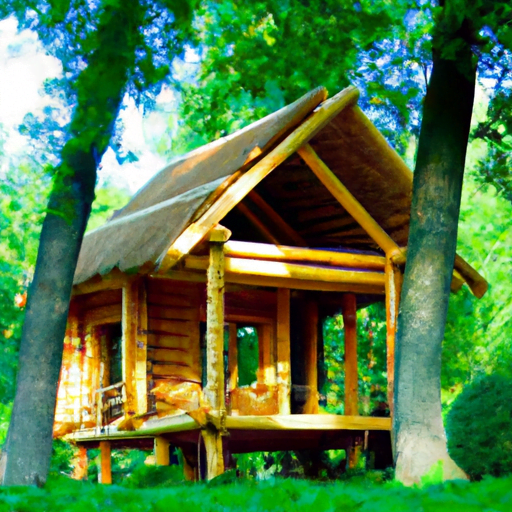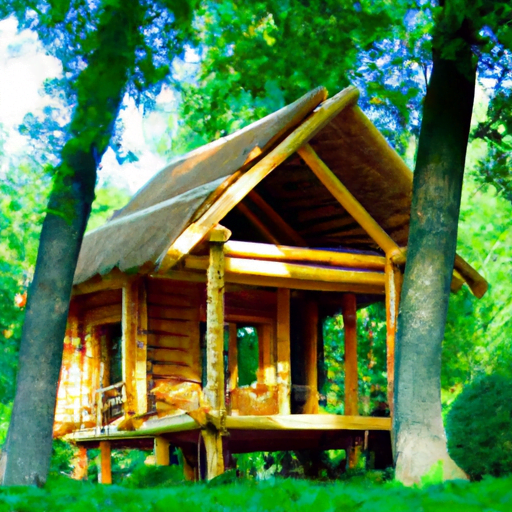Have you ever wondered why more and more people are drawn to the idea of living off the grid? What is it about this unconventional lifestyle that holds such a strong appeal? In this article, we will delve deep into the allure of off-grid living and explore the reasons behind its popularity.
One of the primary reasons people are attracted to off-grid living is the desire for self-sufficiency and independence. Living off the grid allows individuals to break free from the constraints of modern society and rely solely on their own resources. Whether it is generating their own power through solar panels, growing their own food, or collecting rainwater, off-grid living offers individuals the opportunity to take control of their lives and reduce their reliance on external systems.
Another key aspect that attracts people to off-grid living is the desire for a simpler and more environmentally conscious lifestyle. By living off the grid, individuals can drastically reduce their carbon footprint and minimize their impact on the environment. From using renewable energy sources to practicing sustainable agricultural methods, off-grid living provides a way for individuals to live in harmony with nature and promote a more sustainable future.
Furthermore, off-grid living offers a sense of freedom and connection with nature that is often lacking in urban environments. Escaping the noise and congestion of city life, off-grid dwellers can immerse themselves in the tranquility of natural surroundings. The ability to wake up to the sound of birds chirping, breathe in fresh air, and witness the beauty of starlit nights is alluring to those seeking a more peaceful and authentic existence.
In the following article, we will delve deeper into the practical aspects of off-grid living, exploring the challenges and rewards it presents. From understanding the necessary skills and preparations to discussing the financial considerations, we will provide you with a comprehensive guide to help you navigate the world of off-grid living. So, if you’re curious about this alternative lifestyle and want to learn more about how to make it a reality, keep reading.

The Basics of Off-Grid Living
Off-grid living, a lifestyle choice that involves disconnecting from traditional power grids and becoming self-sufficient, is gaining popularity among individuals who seek a more sustainable and independent way of life. This article aims to explore the allure of off-grid living, including its benefits, challenges, and sustainable practices.
What is Off-Grid Living?
Off-grid living refers to a lifestyle in which individuals or communities generate their own electricity, supply their own water, and manage their waste without relying on public utilities. By disconnecting from the grid, individuals can achieve a greater level of self-sufficiency and reduce their environmental impact.
Benefits of Off-Grid Living
One of the primary benefits of off-grid living is energy independence. Instead of relying on power companies and facing potential outages or price fluctuations, off-grid individuals generate their own electricity through renewable energy sources such as solar panels, wind turbines, or hydroelectric systems. This energy autonomy provides a sense of control and security, especially in remote areas where access to the grid may be limited.
Off-grid living also encourages individuals to be more mindful of their water consumption and sources. Water sources, such as rainwater harvesting or well systems, can be utilized to meet daily needs. Furthermore, off-grid individuals employ water conservation methods, such as low-flow fixtures and graywater recycling, to reduce wastage and ensure sustainable use.
Managing waste is another crucial aspect of off-grid living. By practicing composting, recycling, and reusing, off-grid individuals minimize their environmental footprint and contribute towards a circular economy. These waste management solutions promote a sustainable lifestyle and reduce the amount of waste that goes to landfills.
Disconnecting from the Grid
Energy Independence
Generating electricity through renewable energy systems is a key component of off-grid living. Solar panels, for example, convert sunlight into electricity, providing a clean and abundant source of power. Wind turbines harness wind energy, while hydroelectric systems utilize flowing water to generate electricity. These methods allow off-grid individuals to produce their own energy, reducing their reliance on fossil fuel-based electricity.
Water Sources and Conservation
Off-grid individuals often rely on alternative water sources and conservation practices to meet their daily needs. Rainwater harvesting systems collect rainwater from rooftops and use it for household purposes. Wells or boreholes provide access to groundwater, while natural springs can be tapped for clean drinking water. Implementing water conservation techniques, such as water-efficient fixtures and rainwater reuse, contributes to sustainable water use and ensures long-term availability.
Waste Management Solutions
Off-grid individuals employ various waste management solutions to minimize their impact on the environment. Composting organic waste not only reduces the amount of waste sent to landfills but also produces nutrient-rich soil for gardening. Recycling and reusing materials help conserve resources, while minimizing the need for new products. By adopting these waste management practices, off-grid individuals contribute to a circular economy and promote sustainable living.

Sustainable Living Practices
Another aspect that makes off-grid living alluring is its emphasis on sustainable living practices. By implementing these practices, individuals can reduce their ecological footprint and work towards a more environmentally friendly lifestyle.
Renewable Energy Systems
Renewable energy systems, such as solar panels and wind turbines, play a crucial role in making off-grid living sustainable. By harnessing the power of the sun, wind, or water, off-grid individuals can generate clean energy without relying on fossil fuels. This not only reduces greenhouse gas emissions but also promotes a shift towards a more sustainable energy future.
Permaculture and Organic Farming
Off-grid living often involves embracing permaculture and organic farming practices. Permaculture is a sustainable design system that integrates agriculture, ecology, and architecture to create self-sustaining ecosystems. By implementing permaculture principles, such as companion planting, water harvesting, and soil regeneration, individuals can create resilient food systems while minimizing the use of synthetic fertilizers and pesticides.
Water Harvesting and Conservation
Off-grid individuals prioritize water harvesting and conservation as a means of sustainable living. Rainwater is collected through rooftop catchment systems and stored in tanks or cisterns for later use. This allows individuals to rely less on external water sources and promotes a more sustainable water management approach. Additionally, implementing water conservation measures such as low-flow fixtures and water-efficient appliances further reduces water consumption.
Building and Designing Off-Grid Homes
Building and designing off-grid homes require careful consideration of sustainable principles and using eco-friendly materials. By employing passive solar design techniques, individuals can maximize natural heating and cooling, reducing the need for artificial heating or cooling systems.
Passive Solar Design
Passive solar design takes advantage of the sun’s energy to heat and cool the home naturally. This design approach involves factors such as the orientation of the building, placement of windows, and the use of thermal mass to store and release heat. By optimizing passive solar design, off-grid homes can achieve comfortable indoor temperatures without relying on excessive energy consumption.
Choosing Sustainable Materials
When building an off-grid home, selecting sustainable materials is essential for reducing environmental impact. Materials such as reclaimed wood, bamboo, and recycled steel minimize the use of virgin resources and contribute to a circular economy. Additionally, using non-toxic and low-emission building materials ensures a healthier indoor environment.
Off-Grid Home Technologies
Advancements in technology have made off-grid living more accessible and convenient. Innovative off-grid home technologies, such as highly efficient appliances, smart energy management systems, and advanced water filtration systems, enhance the off-grid living experience. These technologies not only improve comfort and convenience but also contribute to a sustainable lifestyle.
Living Off-Grid: Self-Sufficiency and Skills
Living off-grid requires individuals to develop a range of self-sufficiency skills and knowledge. By mastering these skills, off-grid individuals can live more independently and be prepared for any challenges they may face.
Food Production and Preservation
Off-grid living often involves growing one’s food and preserving the harvest. From cultivating a vegetable garden to raising livestock or chickens for eggs and meat, off-grid individuals rely on their agricultural skills to sustain themselves. Additionally, learning techniques for food preservation, such as canning, fermenting, and drying, ensures a year-round food supply.
Emergency Preparedness
Being off the grid means being responsible for managing emergencies without the immediate assistance of public services. Off-grid individuals must be prepared for power outages, natural disasters, or other unexpected situations. This involves having backup power systems, emergency supplies, and knowledge of first aid and emergency response procedures.
Homesteading Skills
Homesteading skills, such as carpentry, plumbing, and basic construction, are valuable for off-grid living. Being able to repair and maintain your home and infrastructure reduces the reliance on external services and ensures self-sufficiency. Additionally, honing traditional skills like sewing, cooking from scratch, and preserving food contributes to a sustainable and self-reliant lifestyle.
The Advantages of Off-Grid Living
Greater Freedom and Independence
One of the main advantages of off-grid living is the sense of freedom and independence it provides. By disconnecting from the grid, individuals are not subject to external power outages, utility bills, or restrictions. They have the freedom to generate their own energy, manage their resources, and live according to their values and priorities.
Reduced Environmental Impact
Living off-grid significantly reduces an individual’s environmental impact. By relying on renewable energy systems and practicing sustainable living, off-grid individuals minimize their carbon footprint, conserve resources, and promote ecological resilience. Off-grid living contributes to the protection of natural habitats, reduction of air and water pollution, and conservation of valuable resources.
Cost Savings in the Long Run
While the initial costs of setting up an off-grid system may be higher compared to connecting to the grid, off-grid living can result in long-term cost savings. By generating their own energy and utilizing sustainable practices, off-grid individuals reduce or eliminate utility bills. Additionally, the ability to grow food and practice self-sufficiency reduces expenses on grocery bills. Over time, these cost savings can add up and contribute to a more financially sustainable lifestyle.
Community and Collaboration in Off-Grid Living
Off-grid living does not necessarily mean living in isolation. Many off-grid individuals choose to live in communities and collaborate to share resources and skills.
Shared Resources and Skills
In off-grid communities, individuals often pool their resources and skills to create a more sustainable and resilient environment. Community gardens, tool-sharing programs, and collective energy systems can help reduce costs and enhance self-sufficiency. By working together, off-grid communities foster a sense of collaboration and support.
Supportive Off-Grid Communities
Being part of an off-grid community can provide a sense of belonging and support. Individuals can exchange ideas, share experiences, and learn from one another’s successes and challenges. This sense of community contributes to a more fulfilling off-grid living experience.
Cooperative Living Models
Some off-grid communities operate under cooperative living models, where individuals share land, resources, and responsibilities. Cooperative living allows for even greater self-sufficiency, as tasks and resources are distributed among community members. This model promotes collaboration, reduces individual burdens, and strengthens community bonds.
The Allure of Simplicity and Connection with Nature
A significant aspect that attracts individuals to off-grid living is the opportunity to embrace simplicity and reconnect with nature.
Escape from Consumerism
Off-grid living offers an escape from the consumer-driven culture that dominates modern society. By living independently from the grid, individuals can focus on their needs rather than constantly chasing material possessions. This shift in mindset fosters a greater appreciation for the non-material aspects of life and encourages sustainable consumption habits.
Reconnecting with Nature
Living off the grid allows individuals to immerse themselves in nature and experience its beauty firsthand. Off-grid individuals often have greater access to natural landscapes, clean air, and wildlife. This connection with nature can improve overall well-being, reduce stress, and cultivate a deeper sense of gratitude for the environment.
Mindfulness and Self-Reflection
By disconnecting from the hectic pace of modern life, off-grid living provides individuals with an opportunity for mindfulness and self-reflection. Living in harmony with nature encourages individuals to slow down, appreciate the present moment, and develop a deeper understanding of themselves and their place in the world.
Moving Towards a More Sustainable Future
Off-grid living is not just a personal choice but also a pathway towards a more sustainable future.
Inspiring Others to Live Off-Grid
By demonstrating the benefits and feasibility of off-grid living, individuals can inspire others to consider adopting a similar lifestyle. Sharing experiences, knowledge, and success stories can encourage a wider acceptance and adoption of sustainable practices.
Government and Policy Changes
As off-grid living gains popularity, it is essential for governments and policy-makers to recognize its value and support its development. Implementing supportive policies, such as incentives for renewable energy systems and sustainable building practices, can further promote off-grid living as a viable and sustainable option.
Education and Awareness
Education and raising awareness about off-grid living are crucial in fostering a more sustainable future. By providing information on the benefits and challenges of off-grid living, as well as practical tips for sustainable practices, individuals can make informed choices and contribute to a more sustainable society.
Conclusion
The allure of off-grid living lies in its promise of greater freedom, self-sufficiency, and sustainability. By disconnecting from the grid and embracing renewable energy systems, sustainable living practices, and a sense of community, individuals can reduce their environmental impact and work towards a more sustainable future. Off-grid living offers an opportunity to escape consumerism, reconnect with nature, and live a more mindful and fulfilling life. As more individuals explore the allure of off-grid living, it becomes a pathway towards a more sustainable and resilient society.




